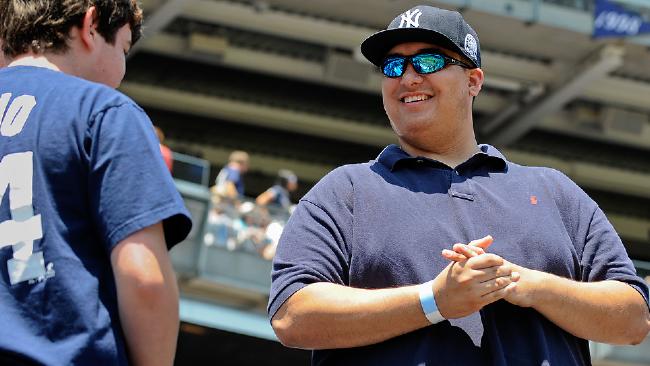It just keeps getting better. And by better, we mean stupider.
Last weekend, writer’s block hit us hard. Our self-imposed Monday morning deadline was coming fast, and we couldn’t think of anything fresh, inventive or polarizing to write about. Then fortune smiled on us in the form of Christian Lopez, an overgrown (hey-oh!) adolescent who thinks he landed in the history books by catching the home run ball Derek Jeter deposited in the Yankee Stadium seats to tally his 3000th career hit. Lopez’s name will be forever immortalized along with What’s His Name, the guy who caught Barry Bonds’ 756th career home run; That Fella, who caught Bill Mazeroski’s World Series-winning homer*; and The Other Fella, who caught Joe Carter’s. But sincerely, we’ll always remember him here. Mr. Lopez has now provided the impetus for 2 (and counting) posts.
By our best estimate the ball he caught is worth $100,000. Or would be if its new owner, obscenely rich Derek Jeter, were to decide to sell it.
You’re never going to catch a noteworthy home run ball, but sooner or later you’ll be the beneficiary of some serendipitous money. An inheritance, a Christmas bonus, pieces of eight from a sunken Spanish galleon. What will you do with it?
If you’re of the Christian Lopez mentality, you return it. What Lopez did this past weekend was no different than if he’d received an unexpected $5000 check from his employer next December and insisted that the employer keep it, in exchange for some company pens and fridge magnets.
If you missed Monday’s breaking news, revealed a few hours after we’d run with that morning’s post, Lopez announced that he’s got “a couple of hundred thousand dollars” in outstanding student loans. He’s 23 years old, and recently received a degree in the productive and demanding field of governmental studies. From St. Lawrence University, where apparently the diplomas are made of jewelry-grade platinum.
The idea is to invest your money, let it grow. That you need to take care of immediate necessities up front (necessities, not extravagances) and sock away the rest hardly counts as an observation, but the college-educated Mr. Lopez needs a remedial lesson. And it’s unlikely that he’s the only one.
Fortunately, that $200,000 investment he purchased is already paying big dividends. Lopez has a lucrative job working as a Verizon sales clerk and is using that as his wealth-building strategy, rather than catching milestone baseballs. As he puts it, “…money’s cool and all…I’ve got a lot of time to make (it).”
Well, he’s right in that money’s cool.
You don’t have the luxury of disregarding money as unimportant when you’re 200-freaking-thousand dollars in the hole. That Lopez is doing anything other than raising his net worth back to zero as quickly as he can shows that his chances of ever getting it, even though he’s only 23, are vanishingly slim.
The irony isn’t just that Derek Jeter wouldn’t have bothered to look twice at Lopez on any other day of his life, it’s that Jeter himself understands personal finance far better than Lopez does. No one seems to remember this, but last fall Jeter spent an entire month squeezing the Yankees for $6 million. He might have the range of a fir tree at shortstop and be a glorified singles hitter, but there‘s no question that Jeter knows how to play this game the right way. Then again, Jeter’s a pro athlete who stays in the media’s good graces, and thus a far better person than you. If anyone’s entitled to negotiate for millions, it’s him. We should accept our lower positions as unworthy of such a privilege, and take whatever crumbs we find.
Not sure if this counts as an accolade, but get a load of the testament to Lopez’s character issued by none other than the guy who sat next to him at the game, his father:
My son could get a million dollars and he’d shrug his shoulders. He’d see a dog get hit by a car and he’d shrug his shoulders. It’s no big deal for him. He’s very cool and calm about everything.
We took two lessons away from that:
a) don’t let your pets play on Lopez’s street and
2) coolness and calmness only apply when you’re not in contact with OMG DEREK JETER! THE CAPTAIN! THE LAST TRUE YANKEE! THE ONLY GUY WHO PLAYS THE GAME THE RIGHT WAY! THE LINEAR HEIR TO REPROBATE RUTH, WIFE-BEATER DiMAGGIO AND DRANK-HIMSELF-INTO-AN-EARLY-GRAVE MANTLE! I’LL DO THINGS TO HIM THAT MARIAH CAREY, MINKA KELLY, ADRIANA LIMA, JESSICA ALBA, THAT OTHER JESSICA, AND MISS UNIVERSE WOULDN’T HAVE DREAMT OF! THEY NEVER KNEW DEREK LIKE I KNOW HIM! WE WERE MEANT TO BE TOGETHER! CAN I HAVE ANOTHER 4 HOT DOGS?
The New York Times ran a provocative piece speculating that in the ultimate addition of insult to injury, multiplied by Avogadro’s number and taken to the 5th power, Lopez might have to pay taxes on the $12,000 in ephemeral tickets and useless trinkets that the Yankees gave him in exchange for the ball. (Lopez admits that team personnel were dumbfounded when he didn’t hold them for any greater ransom. Like they tell you in bizarro negotiating school, always accept the first offer.)
We’ll end with the last line from that New York Times story, and if writer John Leland was trying to be funny, kudos to him:
“I do have the ball,” (Jeter) said. “I held it. It feels like all the rest of them.”
We usually welcome differences of opinion on Control Your Cash, but this piece leaves no room for any. If you sympathize with Lopez, you’re as crazy as he is.
*This has little to do with personal finance, but That Fella actually has an interesting story. 14-year old Andy Jerpe, now a retired engineer, caught what is by rights the biggest home run ball in history; the only one to end Game 7 of a World Series. He got Mazeroski to sign it, then took it home. The following spring, Jerpe took the ball out to play with, and lost it. That he had gone months without any speculator offering ridiculous amounts of money for the ball shows that the ‘60s were a less crazy time than today. The early ‘60s, anyway.




